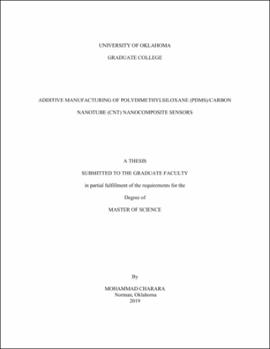| dc.description.abstract | Highly elastic nanocomposite strain sensors have recently received considerable attention in academic research due to broad applications in fields, such as biomedical and robotics. These sensors combine flexible polymers, like polydimethylsiloxane (PDMS), and nanofillers, like carbon nanotubes (CNTs), to increase the electrical conductivity of the base polymer. Typically, these nanocomposites exhibit a change in mechanical property in response to mechanical stimulus, allowing researchers to correlate mechanical deformation to a change in electrical properties. These sensors, however, are often made using methods that are time consuming, waste substantial amounts of material, and require expensive equipment, such as lithography and casting. To address these issues with current sensor manufacturing technology, in this thesis I present 3D printing as a viable alternative to other nanocomposite sensor manufacturing techniques.
To 3D print bulk structures, the extruded materials must have a yield point, so that it can maintain its own weight, and the weight of all layers above it, after printing while curing. Because PDMS does not possess a yield point in its pristine state, CNT’s were added to the material to serve as a thixotropic agent and electrical filler. Rheological testing, via amplitude sweeps, on PDMS/CNT formulations between 1.0 and 3.0 wt% CNT revealed that all formulations with CNT wt% at or above 1.5 possessed a yield point and could be 3D printed. 3D printed cubes were created from the nanocomposite inks with a yield point using two distinct printing patterns. Comparing their electrical properties to that of the cast material, tests revealed that the PDMS/CNT formulation of 1.5 wt% was the ideal formulation and that the 3D printed samples showed a similar conductivity curve as the cast samples.
To test the effect of 3D printing parameters on the piezoresistive response PDMS/CNT compression sensors, samples were 3D printed using various 3D printing needle sizes, various 3D printing speeds, and various infill techniques. The tests reveal that the sample display isotropic piezoresistive behavior which is not dependent on printing speed or 3D printing needle size.
Using this information, a 3D printed sensor was fully characterized using cyclic testing at various max strains and various strain rates. The results reveal the sensor’s resistance increases with applied strain and is highly sensitive, with gauge factors as high as 24 at strains of 1%. Moreover, the sensor displays versatile piezoresistive response with little to no change at varying strain rates. The sensor’s robustness is tested via a 500-cycle durability test which revealed minimal electrical and mechanical degradation from the first to last cycle. Lastly, in-situ micromechanical compressive tests under scanning electron microscope validated the sensor’s piezoresistive mechanism, showing the CNT network rearrangement under compressive load.
This work proves the viability of fabricating nanocomposite-based compression sensors via 3D printing rather than cast. The isotropic behavior of the printed sensors can be exploited to 3D print complex geometries using various 3D printing patterns to achieve similar results to cast sensors without the need for molds. | en_US |
